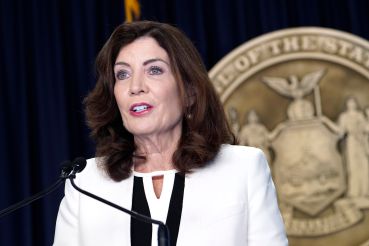With last week’s primary elections behind us, the question for the commercial real estate industry now becomes: how will the result of the November mayoral election effect our industry?
Bill de Blasio (it is assumed that Bill Thompson will either drop out of contention for a runoff or that de Blasio did indeed get 40 percent of the vote needed to avoid the run off) and Joe Lhota have each articulated positions on various issues and have been surprisingly silent on others.
For participants in New York City’s commercial real estate industry, there are three main areas of concern that it would be great to hear more about from the candidates as they will all materially impact our market’s underlying fundamentals, in both the short- and long-term. They are public safety, affordable housing, and real estate taxes.
One could easily argue that the reason New York weathered the Great Recession as well as it did was the massive amount of tourism that continued to thrive in the city between 2008 and 2011. With over fifty million visitors a year, presently the tourism industry is a tremendous stimulant to our local economy.
A big reason why tourism has thrived is because the city is perceived to be a safe, clean place to visit. Much of this is owed to the policies implemented by the Giuliani and Bloomberg administrations and the work that the police force has done to reduce crime, including stopping the various terrorist threats that have been planned since 9/11.
While the candidates have each made their positions on stop and frisk clear, neither have discussed a plan for how they intend to deal with terrorism. Remarkably, neither of the candidates, nor any of the folks who ran for mayor, asked the police department for a briefing on what’s happening on the terrorism front. How they plan to keep the city safe will be a huge determining factor in the economic health of the city moving forward. Despite the lack of a successful attack since 9/11, New York remains a top target for our enemies around the world.
With respect to affordable housing, perhaps the biggest need the city has is for work force housing for all of the folks who work in bakeries, gas stations and drug stores, as well as our teachers, fire fighters and police officers. There is tremendous demand for housing from this group of people. And without them, the city could not function.
The city has the ability, through the use of development rights and incentives, to create this affordable housing. But we have not heard detailed plans from the candidates for how they will go about creating this housing. It is one thing to say that you are going to create 50,000 affordable housing units and quite another to explain exactly how you are going to achieve this objective. This is a major issue for the long-term health of our city and must be addressed in a serious and pragmatic manner.
Lastly, real estate taxes have gotten out of control in New York City. They now eat up as much as 30 percent of gross revenue and are nearly twice as high as in any other major American city.
Real estate tax assessments are supposed to have some relationship to market value. Yet from 2007 through 2010 property value in New York City dropped on average by 38 percent and real estate tax assessments did not decline in even one year. With budget deficits projected for the next several years, and candidates promising unions to make payments on expired municipal contracts that we don’t have the money to pay for, it is anticipated that the only way to make up the difference would be to continue raising real estate taxes.
Income-producing property owners will continue to disproportionately bear the brunt of the majority of these increases, which will continue to have a negative impact on our industry. Moving forward, the market needs to know how each candidate plans to address budget deficits and union contracts and the impact they will have relative to revenue enhancement. Detroit was a warning about how promises to make payments that can’t be kept can tank a city. Raising real estate taxes to mask terrible policy decisions is not a sustainable approach.
Regardless of which side of the aisle you sit, if you are a participant in New York’s commercial real estate marketplace, answers to these questions will have a tangible effect on the next several years of your activity. We all need to hold these candidates accountable for direct answers to these very difficult questions. Then we can make informed decisions about the direction we want for the future of our city.


